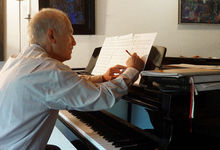Music creates bonds: one book, four languages
Growing together despite differences—this is what people and congregations everywhere experience on a daily basis, and especially when they sing together. In France, a new hymnal has contributed to this in a somewhat unusual way.
On the second Sunday of Advent, 4 December 2016, District Apostle Bernd Koberstein of Germany celebrated a divine service for his brothers and sisters from France and Germany. The service took place in Metz (France) and was transmitted to his congregations in Germany. Following the celebration of Holy Communion the choir sang “Bua Pona”—a hymn that praises the grace of God and the forgiveness of sins. Bua Pona is Tshiluba and is one of four national languages spoken in the Democratic Republic of the Congo. The choir in France did not have to memorize this song nor did it have to be printed in a special leaflet; the music is found directly in the French hymnal.
Tshiluba in a French hymnal? At the beginning of 2015, a new French hymnal was introduced. It not only includes hymns in French, but also in Lingala, Swahili, and Tshiluba. Sixteen African songs were included in the French hymnal. Among them are “Nuru Yenu Yangaze”, “Lelo nde mokolo monene”, and “Ameni”.
A quadrilingual hymnal
During the recent revision of the French hymnal—the last one had been in the 1980s—more than half of the existing hymns were retained, the music and text revised, and new hymns added.
There is a good reason that the hymnal now also includes hymns in Bantu languages. Especially in the suburbs of Paris, but also in other parts of the country, there are many Congolese people, many of whom have been living in France for years now. Among them are also New Apostolic people who left their homes and congregations in Central Africa. In some of the congregations of the Paris-Nord and Normandy-Bretagne church districts more than half the members are of African descent.
Living diversity
That their integration has been a success is something that these brothers and sisters are not only convinced of, it is something they experience all the time. No matter what activities are planned, African and European brothers and sisters do everything together—especially when it comes to music. There are no such things as French and African choirs. They all sing together. And this is working out better and better.
The purpose of music in the divine service is to praise and honour God. Music touches and it prepares the congregation for the proclamation of the word. And “not least of all, music fosters a sense of fellowship among listeners and musicians alike,” it says in the Catechism of the New Apostolic Church (12.1.14).
This is exactly what the new hymnal is doing in our congregations in France: fostering a sense of togetherness. Different traditions, styles, and melodies from different cultures are bound together in one book. Music strengthens social bonds.
Article info
Author:
Date:
Keywords:
Oliver Rütten
13.12.2016
object-oriented features,
Africa,
Democratic Republic of the Congo,
Europe,
France,
International,
Music,
Congregational life






